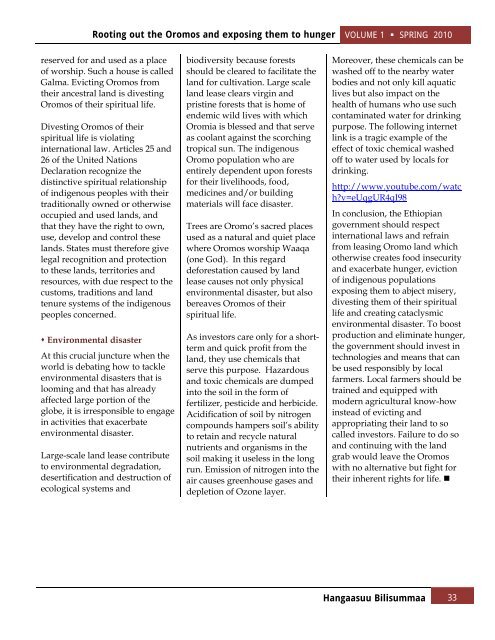Hangaasuu Bilisummaa Journal Volume 1 - ULFO
Hangaasuu Bilisummaa Journal Volume 1 - ULFO
Hangaasuu Bilisummaa Journal Volume 1 - ULFO
Create successful ePaper yourself
Turn your PDF publications into a flip-book with our unique Google optimized e-Paper software.
Rooting out the Oromos and exposing them to hunger VOLUME 1 SPRING 2010<br />
reserved for and used as a place<br />
of worship. Such a house is called<br />
Galma. Evicting Oromos from<br />
their ancestral land is divesting<br />
Oromos of their spiritual life.<br />
Divesting Oromos of their<br />
spiritual life is violating<br />
international law. Articles 25 and<br />
26 of the United Nations<br />
Declaration recognize the<br />
distinctive spiritual relationship<br />
of indigenous peoples with their<br />
traditionally owned or otherwise<br />
occupied and used lands, and<br />
that they have the right to own,<br />
use, develop and control these<br />
lands. States must therefore give<br />
legal recognition and protection<br />
to these lands, territories and<br />
resources, with due respect to the<br />
customs, traditions and land<br />
tenure systems of the indigenous<br />
peoples concerned.<br />
Environmental disaster<br />
At this crucial juncture when the<br />
world is debating how to tackle<br />
environmental disasters that is<br />
looming and that has already<br />
affected large portion of the<br />
globe, it is irresponsible to engage<br />
in activities that exacerbate<br />
environmental disaster.<br />
Large-scale land lease contribute<br />
to environmental degradation,<br />
desertification and destruction of<br />
ecological systems and<br />
biodiversity because forests<br />
should be cleared to facilitate the<br />
land for cultivation. Large scale<br />
land lease clears virgin and<br />
pristine forests that is home of<br />
endemic wild lives with which<br />
Oromia is blessed and that serve<br />
as coolant against the scorching<br />
tropical sun. The indigenous<br />
Oromo population who are<br />
entirely dependent upon forests<br />
for their livelihoods, food,<br />
medicines and/or building<br />
materials will face disaster.<br />
Trees are Oromo’s sacred places<br />
used as a natural and quiet place<br />
where Oromos worship Waaqa<br />
(one God). In this regard<br />
deforestation caused by land<br />
lease causes not only physical<br />
environmental disaster, but also<br />
bereaves Oromos of their<br />
spiritual life.<br />
As investors care only for a shortterm<br />
and quick profit from the<br />
land, they use chemicals that<br />
serve this purpose. Hazardous<br />
and toxic chemicals are dumped<br />
into the soil in the form of<br />
fertilizer, pesticide and herbicide.<br />
Acidification of soil by nitrogen<br />
compounds hampers soil’s ability<br />
to retain and recycle natural<br />
nutrients and organisms in the<br />
soil making it useless in the long<br />
run. Emission of nitrogen into the<br />
air causes greenhouse gases and<br />
depletion of Ozone layer.<br />
Moreover, these chemicals can be<br />
washed off to the nearby water<br />
bodies and not only kill aquatic<br />
lives but also impact on the<br />
health of humans who use such<br />
contaminated water for drinking<br />
purpose. The following internet<br />
link is a tragic example of the<br />
effect of toxic chemical washed<br />
off to water used by locals for<br />
drinking.<br />
http://www.youtube.com/watc<br />
h?v=eUqgUR4qI98<br />
In conclusion, the Ethiopian<br />
government should respect<br />
international laws and refrain<br />
from leasing Oromo land which<br />
otherwise creates food insecurity<br />
and exacerbate hunger, eviction<br />
of indigenous populations<br />
exposing them to abject misery,<br />
divesting them of their spiritual<br />
life and creating cataclysmic<br />
environmental disaster. To boost<br />
production and eliminate hunger,<br />
the government should invest in<br />
technologies and means that can<br />
be used responsibly by local<br />
farmers. Local farmers should be<br />
trained and equipped with<br />
modern agricultural know-how<br />
instead of evicting and<br />
appropriating their land to so<br />
called investors. Failure to do so<br />
and continuing with the land<br />
grab would leave the Oromos<br />
with no alternative but fight for<br />
their inherent rights for life. <br />
<strong>Hangaasuu</strong> <strong>Bilisummaa</strong> 33


